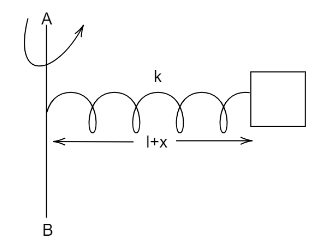Question
Question: A particle of mass m is fixed to the end of a light spring of force constant k and unstretched lengt...
A particle of mass m is fixed to the end of a light spring of force constant k and unstretched length l. The system is rotated about the other end of the spring with an angular ω ,in gravity free space. The increase in length of the spring will be
A. kmω2l
B. k−mω2mω2l
C. k+mω2mω2l
D. None
Solution
Mass of the particles is given, spring constant is also given to us and the system is rotating in an angular frequency hence we can calculate the above problem by equating the centripetal force with the elastic force. Solving further we can get the value of increase in length of the spring.
Complete step by step answer:
As per the given problem,mass of the particle is given by m which is fixed at end of a light spring of force constant k and it unstretched length is l and if the system is rotated about the other end of the spring the there will be a stretched in the spring which is represented as x hence the radius of the ruated system will be l+x and also the angular frequency of the rotated system is ω.

According to the given condition we can conclude that the electric force will provide the required centripetal force or in other word we can say that electric force is equal to centripetal force of the rotated system. We know,
Elastic force of a spring= kx
Centripetal force= mω2r
Equating both of them we get,
kx=mω2r
Here r=l+x
Putting the changed r value in the above equation we get,
kx=mω2(l+x)
⇒kx=mω2l+mω2x
Here x is the increased in length of the spring due to rotation of the system
Hence by further solving the [problem we get,
kx−mω2x=mω2l
Taking x as common term from LHS side we get,
x(k−mω2)=mω2l
Rearranging the above equation we get,
∴x=(k−mω2)mω2l
Hence we get the increases in length of the spring is x=(k−mω2)mω2l .
Therefore the correct option is (B).
Note: Before solving this kind of problem, first change the length of the spring because if a spring is rotated then their length must change its length. If you don’t change the length of the spring after the system is rotated then you will get the wrong answer.
